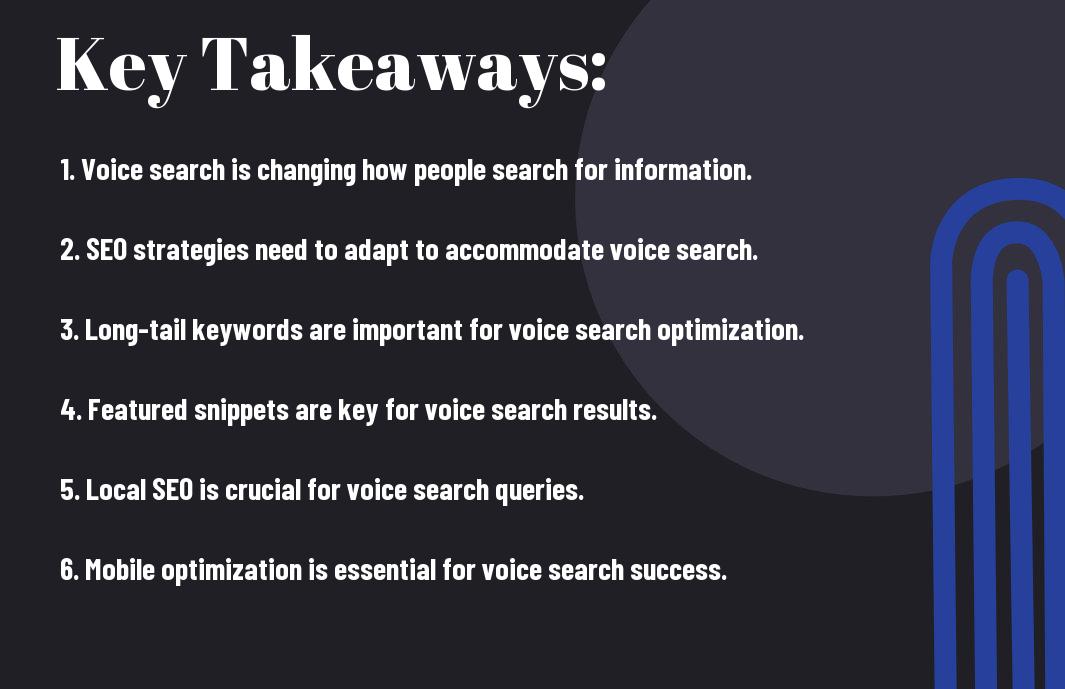Are you aware of just how much voice search has revolutionized the way people search for information online? No longer are users limited to typing in search queries; now, they simply ask a question aloud and receive a response. This advancement has had significant implications for SEO strategies, as it has changed the way search engines interpret and prioritize content. With the increasing prevalence of voice search, it is essential to understand the impact it has on SEO in order to position your website for success in the digital landscape. In this blog, we will explore the key implications of voice search on SEO, and how you can adapt your strategies to stay ahead in the game.
Key Takeaways:
- Voice search is on the rise: With the increasing popularity of virtual assistants and smart speakers, the use of voice search is growing rapidly, making it crucial for SEO strategies to adapt to this trend.
- Long-tail keywords are essential: Voice searches tend to be more conversational and specific, so optimizing for long-tail keywords is vital for capturing voice search traffic.
- Local SEO gains importance: Voice searches often involve local queries, making local SEO optimization more critical than ever for businesses looking to capitalize on voice search traffic.
- Featured snippets are key: Securing featured snippets can help websites gain visibility in voice search results, as virtual assistants often pull information from these snippets to answer user queries.
- User intent is crucial: Understanding and catering to user intent is key for optimizing for voice search, as virtual assistants strive to provide the most relevant and helpful answers to user queries.

The Mechanics of Voice Search
Some of the most essential elements of voice search are the mechanics behind it. Understanding how voice search works can help you optimize your website for this technology and improve your SEO strategy.
Understanding Natural Language Processing (NLP)
When you speak to a voice-enabled device, it utilizes natural language processing (NLP) to understand the meaning behind your words. NLP allows the device to interpret and respond to natural language input, enabling a more conversational interaction. In order to optimize your website for voice search, you must consider the way people speak and the phrases they use when conducting voice searches. By incorporating natural language phrases into your content, you can improve your chances of being picked up by voice search algorithms and increase your visibility to potential customers.
Voice Recognition and Search Algorithms
Voice recognition technology is vital for accurately transcribing spoken words into text. This technology is constantly improving, allowing for better understanding and interpretation of voice commands. When you conduct a voice search, the search algorithms work to match your spoken query with the most relevant results. By fine-tuning your content to align with the way people speak, you can optimize your website for voice search and improve your SEO. It’s important to keep up with the advancements in voice recognition and search algorithms to ensure that you are adapting your SEO strategy to align with these changes and capitalize on the growing popularity of voice search.
Voice Search and SEO Strategies
Not keeping up with the latest trends in voice search can have a detrimental impact on your SEO strategy. With the rising popularity of voice search, it’s essential to adapt your SEO strategies to accommodate this shift in user behavior. To understand the impact of voice search on SEO and how to optimize your strategy, you can find valuable insights in this article on The Future of Voice Search and Its Impact on SEO.
Keyword Research for Spoken Queries
When it comes to optimizing for voice search, keyword research takes on a new dimension. Instead of focusing solely on short, concise keywords, you must now consider the natural language and conversational tone people use when speaking. This means focusing on long-tail keywords and phrases that accurately reflect the way people verbally ask questions or seek information. Understanding user intent and incorporating natural language keywords into your content is crucial for optimizing your website for voice search.
Content Optimization for Voice Search
Optimizing your content for voice search involves creating conversational, informative, and valuable material that directly addresses the specific questions and queries your audience is likely to voice. Structuring your content in a question-and-answer format can be particularly effective for aligning with voice search queries. Additionally, ensuring your content is concise, clear, and formatted for easy consumption can significantly improve its performance in voice search results.
Challenges and Opportunities
Despite the challenges that voice search presents for traditional SEO practices, there are also significant opportunities for those who can adapt and optimize their strategies for this new paradigm. If you want to learn more about the impact of voice search on SEO and Digital Marketing, check out this article.
Adapting to the Shift from Typing to Talking
Adapting to the shift from typing to talking requires a fundamental rethinking of keyword targeting and content optimization. With voice search, natural language and long-tail keywords are becoming increasingly important. Understanding the nuances of conversational query language and optimizing your content to address these queries is essential for maintaining visibility in voice search results.
Leveraging Voice Search for Local SEO
One of the most significant opportunities presented by voice search is its impact on local SEO. Voice search queries are often highly localized, with users seeking information about nearby businesses and services. Optimizing your content for voice search can significantly improve your visibility in local search results, driving increased foot traffic and conversions for your business.
The Future of Voice Search and SEO
Your understanding of voice search and SEO is crucial for staying ahead of the game in the ever-evolving digital landscape. As technology continues to advance, it’s important to look ahead and consider what the future holds for voice search and its impact on SEO.
Predictions and Emerging Trends
As voice search technology continues to improve, it is predicted that more than half of all searches will be conducted through voice by 2022. This shift will lead to a greater emphasis on long-tail keywords and natural language search queries. Additionally, the rise of virtual assistants and smart speakers will play a significant role in shaping the future of voice search, as these devices become more integrated into daily life.
Preparing for Continued Innovation
As voice search technology continues to evolve, it’s crucial to stay informed about emerging trends and adapt your SEO strategy accordingly. Optimizing for featured snippets and ensuring that your content is structured for voice search will be key to maintaining a competitive edge. Additionally, keeping an eye on new developments in voice technology and being prepared to pivot your strategy as needed will be essential for success in the future.

The Impact of Voice Search on SEO
Now that you have a better understanding of the impact voice search has on SEO, it’s important to implement strategies that will cater to this growing trend. As more and more users rely on voice search to find information, businesses need to optimize their content to be voice-search friendly. This means creating conversational, long-tail keyword phrases, optimizing for local search, and ensuring your website is mobile-friendly. By adapting your SEO strategy to accommodate voice search, you can stay ahead of the competition and make it easier for potential customers to find and engage with your content.
FAQ: The Impact of Voice Search on SEO
Q: What is voice search and how does it impact SEO?
A: Voice search is the use of spoken language to search for information on the internet, typically through mobile devices or smart speakers. This trend is impacting SEO as it requires a shift towards more natural language and long-tail keywords to match the way people speak and ask questions.
Q: How does voice search differ from traditional text-based search?
A: Voice search tends to be more conversational and question-based, while traditional text-based search often involves shorter, more fragmented keywords. Voice search also often yields spoken responses instead of a list of search results, requiring a different approach to SEO to appear in these voice-based results.
Q: What strategies can be used to optimize for voice search?
A: To optimize for voice search, focus on creating content that answers specific questions in a conversational tone. Additionally, optimizing for local search can be important, as voice search is often used for local queries such as “near me” searches.
Q: Is voice search likely to continue growing in popularity?
A: Yes, voice search is expected to continue growing, especially with the increasing use of smart speakers and virtual assistants. It is important for businesses and marketers to adapt to this trend in order to remain competitive in the online space.
Q: How can businesses stay ahead of the curve in terms of voice search and SEO?
A: Staying ahead in terms of voice search and SEO involves staying informed about emerging trends and technologies, as well as consistently monitoring and adapting to changes in search algorithms. Additionally, investing in high-quality, conversational content and optimizing for local search can help businesses maintain a strong presence in voice search results.
